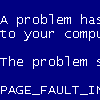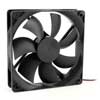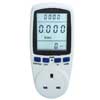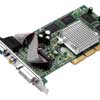Hardware
Home servers can take many guises, and an old or long forgotten PC lying around
can be just as useful as buying a purpose built one from new. However they all
need to follow a set of basic requirements that make the experience better for
the user, with more coming into play dependant on what the server is going to be
used for, these are explained more detail in the role sections.
 Reliability is by far the most
important, therefore if that old machine didn't have any problems when it was in
use it may be a good candidate for a home server. The goal of all this is to
have a PC tucked away somewhere almost forgotten but always there when needed,
so constant restarts and if it is headless (no keyboard / mouse / monitor
connected) dragging it to a monitor to fault find can get frustrating.
Reliability is by far the most
important, therefore if that old machine didn't have any problems when it was in
use it may be a good candidate for a home server. The goal of all this is to
have a PC tucked away somewhere almost forgotten but always there when needed,
so constant restarts and if it is headless (no keyboard / mouse / monitor
connected) dragging it to a monitor to fault find can get frustrating.
 Quiet operation is essential for
smaller homes without the luxury of placing it far away like a garage or shed.
From personal experience placing a server close to where you sleep is not
advised as the temptation to switch it off becomes very strong. In a quest for
quietness desktop machines from PC vendors rather than home built are a better
choice as they tend achieve cooling with less fans.
Quiet operation is essential for
smaller homes without the luxury of placing it far away like a garage or shed.
From personal experience placing a server close to where you sleep is not
advised as the temptation to switch it off becomes very strong. In a quest for
quietness desktop machines from PC vendors rather than home built are a better
choice as they tend achieve cooling with less fans.
 Cost of power consumption can really
add up over a year, so using an old gaming PC with power hungry graphics cards
may not be the best choice even if it gives better processing power. To give
perspective Inline power meters are a great way to see how much it is using when
idle and under load. Newer power monitors
even display operating cost in real time.
Cost of power consumption can really
add up over a year, so using an old gaming PC with power hungry graphics cards
may not be the best choice even if it gives better processing power. To give
perspective Inline power meters are a great way to see how much it is using when
idle and under load. Newer power monitors
even display operating cost in real time.
 Components or what's inside the PC
can greatly differ, and each role the server is assigned affects what is in
greatest demand by the system. What is common in all servers are the need for
networking, wireless can be used but a wired connection is much preferred due to
its reliability. Keep everything to the bare basics, then add to the machine as
a role requires it.
Components or what's inside the PC
can greatly differ, and each role the server is assigned affects what is in
greatest demand by the system. What is common in all servers are the need for
networking, wireless can be used but a wired connection is much preferred due to
its reliability. Keep everything to the bare basics, then add to the machine as
a role requires it.